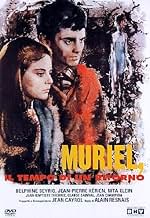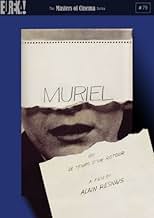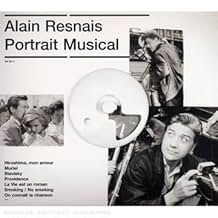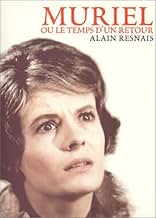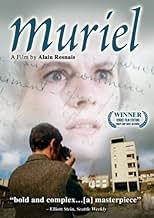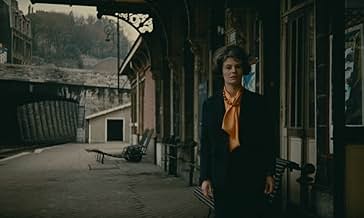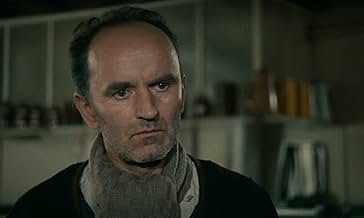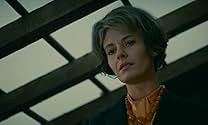AVALIAÇÃO DA IMDb
7,0/10
4 mil
SUA AVALIAÇÃO
Adicionar um enredo no seu idiomaIn the seaside town of Boulogne, no one seems to be able to cope with their past, least of all Hélène, an antique furniture saleswoman, her stepson Bernard, and her former lover Alphonse.In the seaside town of Boulogne, no one seems to be able to cope with their past, least of all Hélène, an antique furniture saleswoman, her stepson Bernard, and her former lover Alphonse.In the seaside town of Boulogne, no one seems to be able to cope with their past, least of all Hélène, an antique furniture saleswoman, her stepson Bernard, and her former lover Alphonse.
- Prêmios
- 3 vitórias e 3 indicações no total
Jean-Baptiste Thiérrée
- Bernard Aughain
- (as Jean-Baptiste Thierrée)
Wanda Kerien
- La cliente
- (as Wanda Kérien)
Avaliações em destaque
"Muriel" (1963) directed by Alain Resnais is a drama about the persistence of memory (aren't all Resnains' films? Incidentally, I named my review of "Hiroshima Mon Amour" that I saw about two years ago, "Persistence of Memory".)
Muriel of the title is dead by the time the movie begins, the victim of torture by the French soldiers during the occupation of Algeria. One of the soldiers, Bernard, is back in France living with his step-mother, Helene (Delphine Seyrig) in the province city Boulogne and hunted by the memories of war and Muriel. Helen deals with her own past and memories of Alphonse (Jean-Pierre Kérien), an ex-lover who comes from Paris to visit her in the company of his new 20-years-old girlfriend, Françoise (Nita Klein)
The story which Resnais tells is simple and the trailer for the movie gives a viewer a very good idea of what they are about to see: The Past. The present. The future - is it possible? Uncertainty. Suspicions. Lies. Four main characters, Helene, Alphonse, Bertrand, and Françoise are in search of what they are. There will be secrets and confessions. Is that time to love? The main theme of the film is reality vs. memory of it. Can we always trust ourselves with what we remember? Does our memory reflect the events the way they really happened or our vision of them is altered as time passes and new realities inevitably enter our lives?
What makes "Muriel" unique after all these years is the way the director presents the journey into the past of his characters, how they see it, and how it affects their present lives and the possibility (or rather impossibility) of love and happiness. Alain Resnains uses quick flashes of memory in the form of almost hypnotizing jump cuts of his genius cinematographer Sacha Vierny (Resnains and Vierny had made 10 films together). Vierny provided beautiful melancholic visual palette of washed out colors that created the atmosphere of unbearable sadness, loss, and hopelessness. Vierny who always underlined his preference for atmosphere over formal perfection, had said, "My satisfaction is that the photography is not remarked on too much for itself". The visual originality and innovation are accompanied by unusual unnerving soundtrack, eerie and haunting that adds to the understanding of guilt and remorse the film characters live with.
"Muriel" is a puzzling and multi-layered film that is easy to admire and meditate on. It is not entertaining or heart-warming and it is hard to identify with its heroes (or anti-heroes) but is always fascinating and rewarding and it may reveal its secrets after multiple viewings.
Muriel of the title is dead by the time the movie begins, the victim of torture by the French soldiers during the occupation of Algeria. One of the soldiers, Bernard, is back in France living with his step-mother, Helene (Delphine Seyrig) in the province city Boulogne and hunted by the memories of war and Muriel. Helen deals with her own past and memories of Alphonse (Jean-Pierre Kérien), an ex-lover who comes from Paris to visit her in the company of his new 20-years-old girlfriend, Françoise (Nita Klein)
The story which Resnais tells is simple and the trailer for the movie gives a viewer a very good idea of what they are about to see: The Past. The present. The future - is it possible? Uncertainty. Suspicions. Lies. Four main characters, Helene, Alphonse, Bertrand, and Françoise are in search of what they are. There will be secrets and confessions. Is that time to love? The main theme of the film is reality vs. memory of it. Can we always trust ourselves with what we remember? Does our memory reflect the events the way they really happened or our vision of them is altered as time passes and new realities inevitably enter our lives?
What makes "Muriel" unique after all these years is the way the director presents the journey into the past of his characters, how they see it, and how it affects their present lives and the possibility (or rather impossibility) of love and happiness. Alain Resnains uses quick flashes of memory in the form of almost hypnotizing jump cuts of his genius cinematographer Sacha Vierny (Resnains and Vierny had made 10 films together). Vierny provided beautiful melancholic visual palette of washed out colors that created the atmosphere of unbearable sadness, loss, and hopelessness. Vierny who always underlined his preference for atmosphere over formal perfection, had said, "My satisfaction is that the photography is not remarked on too much for itself". The visual originality and innovation are accompanied by unusual unnerving soundtrack, eerie and haunting that adds to the understanding of guilt and remorse the film characters live with.
"Muriel" is a puzzling and multi-layered film that is easy to admire and meditate on. It is not entertaining or heart-warming and it is hard to identify with its heroes (or anti-heroes) but is always fascinating and rewarding and it may reveal its secrets after multiple viewings.
This movie was made in the context of the revolution in the French cinema and novel which took place in the sixties. Just like the work of Margueritte Duras and Claude Simon whose novels avoided a straightforward narrative style, this movie tells its story in an episodic and almost surreal manner.
This can make it difficult going for anyone seeking a simple tale, well told. But, if your taste runs to the more abstract, there is a lot to like here. Like "Juliet of the Spirits" this movie is infused with an intensely subjective portrayal of the story which unfolds of a betrayed love, an act of war time atrocity, and the desparate plight of a compulsive gambler.
Excellent cinematography and direction make this movie a wonderful and richly textured work which deserves several viewings to appreciate completely.
This can make it difficult going for anyone seeking a simple tale, well told. But, if your taste runs to the more abstract, there is a lot to like here. Like "Juliet of the Spirits" this movie is infused with an intensely subjective portrayal of the story which unfolds of a betrayed love, an act of war time atrocity, and the desparate plight of a compulsive gambler.
Excellent cinematography and direction make this movie a wonderful and richly textured work which deserves several viewings to appreciate completely.
I had never seen an Alain Resnais movie before. Despite the fact most of my IMDb friends had told me to start off with Hiroshima Mon Amour, I was more drawn to Muriel and chose it as my first taste of Resnais. In a nutshell: it was far more interesting thematically and cinematographically (also on a purely technical level) than it was enjoyable. I'm still very glad that I saw it, though. The most fascinating aspect of it was without doubt the montage, or editing. Rather than directing or acting, or even the screen writing, it was the editing that had the lion's share of the movie, as if it were its star. I cannot think of another movie where this is quite as apparent. Some of Muriel's style of editing felt like machine-gun-fire, being so relentlessly fast and aggressive in parts, but it was in my opinion very powerful and efficient in leaving an impression of "mental flashes". This emulated the nature of memory, which is the theme at the heart of an otherwise grim and pessimistic movie. Yet this darkness is masked by an appearance of everyday banality in a provincial town, making it all the more depressing, since it's easier to relate the melancholy at its core to one's own, everyday existence. Not for nothing, the movie was also set in winter, and nothing is quite as melancholy and nostalgic as a sea-side town off-season.
The last 10 minutes of the movie, more or less from the "revelation" at Hélène's Sunday lunch right to the moments in which the word "Fin" (The End) appeared on the screen, were the most powerful bout of cinematic caffeine I've experienced in a while. Until that moment I was starting to worry that the film was going nowhere too specific, or at least not somewhere that I understood or knew. Then came the final emotional earthquake, redeeming the movie tenfold, and I was virtually just as shocked as most of the characters in it.
OK, I'll admit I wasn't overly enamoured of the acting. With the exception of Delphine Seyrig playing Hélène, who succeeded in convincing me with her interpretation of the character as well as making me feel sympathetic towards her, the other players left me virtually cold. For a while I thought I'd like Nita Klein playing Françoise, then I started thinking that her character was pretty much redundant and should have been far more marginal than it actually was (and what was going on between her and Bernard anyway? That felt like a contrivance). Since I mentioned Bernard, played by Jean-Baptiste Thierrée, let me say that he was the character I was least convinced by. Quite frankly, I wasn't partial to the way the actor chose to bring him to life at all. Yet he and his drama - the traumas he'd experienced during the Algerian war, his witnessing the torture of an Algerian girl, the titular Muriel, which scarred him for life - was probably the heart and kernel of the movie! Jean-Pierre Kérien playing Alphonse, is the player that most viewers here seem to criticise. In my view there wasn't much else he could have done with the character, seeing as he was mostly a pretext for Hélène's tragedy. But in the last ten minutes of the movie Alphonse's raison d'être comes sharply to the forefront, thanks to the shocking revelation previously mentioned. It was Bernard that I expected more from acting-wise, I guess. Furthermore, the soundtrack was occasionally strident and annoying, perhaps trying to be an aural version of the editing. But while it worked on a visual level, the music's jarred quality was ultimately grating.
However, for the courage with which the movie tackled subjects which are best rendered in a novel form, for its successfully experimental editing, as well as its genuinely moving ending, I'll still award Muriel a pretty high score: 7.5/10 (it would have been 8 if the acting, not just from Seyrig, had been more accomplished).
The last 10 minutes of the movie, more or less from the "revelation" at Hélène's Sunday lunch right to the moments in which the word "Fin" (The End) appeared on the screen, were the most powerful bout of cinematic caffeine I've experienced in a while. Until that moment I was starting to worry that the film was going nowhere too specific, or at least not somewhere that I understood or knew. Then came the final emotional earthquake, redeeming the movie tenfold, and I was virtually just as shocked as most of the characters in it.
OK, I'll admit I wasn't overly enamoured of the acting. With the exception of Delphine Seyrig playing Hélène, who succeeded in convincing me with her interpretation of the character as well as making me feel sympathetic towards her, the other players left me virtually cold. For a while I thought I'd like Nita Klein playing Françoise, then I started thinking that her character was pretty much redundant and should have been far more marginal than it actually was (and what was going on between her and Bernard anyway? That felt like a contrivance). Since I mentioned Bernard, played by Jean-Baptiste Thierrée, let me say that he was the character I was least convinced by. Quite frankly, I wasn't partial to the way the actor chose to bring him to life at all. Yet he and his drama - the traumas he'd experienced during the Algerian war, his witnessing the torture of an Algerian girl, the titular Muriel, which scarred him for life - was probably the heart and kernel of the movie! Jean-Pierre Kérien playing Alphonse, is the player that most viewers here seem to criticise. In my view there wasn't much else he could have done with the character, seeing as he was mostly a pretext for Hélène's tragedy. But in the last ten minutes of the movie Alphonse's raison d'être comes sharply to the forefront, thanks to the shocking revelation previously mentioned. It was Bernard that I expected more from acting-wise, I guess. Furthermore, the soundtrack was occasionally strident and annoying, perhaps trying to be an aural version of the editing. But while it worked on a visual level, the music's jarred quality was ultimately grating.
However, for the courage with which the movie tackled subjects which are best rendered in a novel form, for its successfully experimental editing, as well as its genuinely moving ending, I'll still award Muriel a pretty high score: 7.5/10 (it would have been 8 if the acting, not just from Seyrig, had been more accomplished).
Some decades before Haneke's 'Cache' once more centralised the trope of Algeria-guilt amongst the bourgeoisie, 'Muriel' is less a polemical allegory-and less marked by immigrant experience-and more a kind of spider's web of implication, its critique of French conduct in Algeria constructed as a kind of puzzle which is only really a puzzle if we ignore those political truths hiding in plain sight-which is precisely the point. Haneke is concerned to reveal his cards half-way through the film-it's important that one *get* and *absorb* a message. Likewise, in Muriel, the account of torture committed by the ex-soldier now returned to Boulogne-sur-Mer plays out at the half-way point. But for Resnais and scriptwriter Jean Cayrol, to whom the film equally owes its striking detail and shape, form and message are imbricated in closer ways. Likewise, compared to other experiments with narrative within avant-garde cinema of the period-including Resnais' own-here, complexities of perception rendered through avant-garde technique may reflect existential questions of memory, desire and so on, but more precisely, they serve a political purpose. As in Demy's Parapluies de Cherbourg the following year, the film's critique of French conduct in Algeria is presented as both motor to and peripheral figure / irritant within what is in some ways a love story. But there are no Michel Legrand songs here, no bright-burning neon glow, no dwelling in sentiment: the film is analytical, critical, clipped, dense. The constructs of desire, loss, the attempt to regain past intimacy, told in half-finished stories, never-received letters, interrupted monologues, the constant unspoken-the evasions and illusions of romantic love-are open secrets around which the lovers tip-toe, traipse and on which they trample, while the Algerian conflict is imbricated within the social fabric of a particular town, and, metonymically, the broader society in which it has its place. Of particular interest for the film is the way that the community of that town is constructed through a mixture of the repressed memory of trauma (the second world war and national service in Algeria-attack by or complicity with fascist occupation domestically and participation in colonial violence abroad), the militarist underlay of the business world, of Gaullism, of particular modes of masculine identity. The clipped precision of the film's extreme fast-cutting turns editing at once almost hallucinatory in its flashes of distorted logic and extraordinarily precise in its planned juxtapositions: the trope of mystery-who is Muriel? What happened in Algeria? What happened to break apart the now elderly lovers reunited in a web of half-truths, half-desires, and deceit?-a diagnostic frame at once personal and social. Resnais may suggest that film itself-at least, as conceived of as a repository of direct truth, the authenticity of visual experience-is inadequate: as when the young ex-soldiers' Algerian footage literally burns up in the projector when exposed to the light. But film, understood differently-for its challenge to, its going against the grain of perception-provides the shock to the habituated dailiness of looking so that an antique table, the door to a café, a walk around town, the assassination of a far-right terrorist, flicker and bunch up together like a terrible revelation of what lies beneath.
Slow burn relationship drama, an old relationship renewed and examining current relationships; lovers, family... The title of the film itself seems a play on words as it's less a take-your-pick affair than it is saying the film is about these two things, connected but because the characters share connections in the present day.
Here again we see Resnais exploring themes of time and memory as was the case with his previous two feature films: Last Year At Marienbad and Hiroshima Mon Amour. This, his third feature, reflects on times past, the characters talk about the past, but it doesn't go into filmed flashbacks or creative revisiting, looping back on itself, adding or changing subtle details. Memory does also come into play. With the one side of the two stories it's two characters with a shared past, of which one asks why this, how come, what were you thinking then...the other attempts to answer. But it remains elusive, a story told in pieces. Hard to assimilate as we aren't really shown enough connect-the-dot details of a shared past so much as we are just shown they had a shared past and make of it what you will. This approach can wear thin...it lacks cohesion and as a consequence comes up short on dramatic tension. The other part of the story also looks to the past, also fragmented and elusive.
Early on the sound score, arriving at specific points, provides more than emphasis or support as it temporarily lends an air of mystery or sly menace that wouldn't necessarily be noticed at all otherwise. Neat trick in the way it suggests unsettled feelings or hints at perhaps darker revelations to come, something I didn't get from the dialogue alone. It too is another piece. There is other symbolism to be found, a gun shown disassembled, in pieces...
At a couple points the film goes into quick edits. A single line of dialogue, jump to another scene and another line. On and on. More little pieces. It may have seemed a clever film editing technique at the time but the dialogue as presented is disconnected, unfocusing the passage of time with muddled glimpses. Which may have been the point but more than anything I found it to be somewhat annoying.
Enough. The film is an exercise in patience. For me, too much so because, even though it comes to some conclusions, in the end I didn't feel it was enough to justify the scattered approach of uncertain reflections and eventual points made. Even though from the same time period, I don't feel this film is in the same class as the Resnais films Marienbad and Hiroshima, two films that are masterpieces or nearly so. You could say the approach with Muriel is radical, as was the case in those two previous films, but that doesn't, in and of itself, make it a great film. In my opinion, yours may differ.
Here again we see Resnais exploring themes of time and memory as was the case with his previous two feature films: Last Year At Marienbad and Hiroshima Mon Amour. This, his third feature, reflects on times past, the characters talk about the past, but it doesn't go into filmed flashbacks or creative revisiting, looping back on itself, adding or changing subtle details. Memory does also come into play. With the one side of the two stories it's two characters with a shared past, of which one asks why this, how come, what were you thinking then...the other attempts to answer. But it remains elusive, a story told in pieces. Hard to assimilate as we aren't really shown enough connect-the-dot details of a shared past so much as we are just shown they had a shared past and make of it what you will. This approach can wear thin...it lacks cohesion and as a consequence comes up short on dramatic tension. The other part of the story also looks to the past, also fragmented and elusive.
Early on the sound score, arriving at specific points, provides more than emphasis or support as it temporarily lends an air of mystery or sly menace that wouldn't necessarily be noticed at all otherwise. Neat trick in the way it suggests unsettled feelings or hints at perhaps darker revelations to come, something I didn't get from the dialogue alone. It too is another piece. There is other symbolism to be found, a gun shown disassembled, in pieces...
At a couple points the film goes into quick edits. A single line of dialogue, jump to another scene and another line. On and on. More little pieces. It may have seemed a clever film editing technique at the time but the dialogue as presented is disconnected, unfocusing the passage of time with muddled glimpses. Which may have been the point but more than anything I found it to be somewhat annoying.
Enough. The film is an exercise in patience. For me, too much so because, even though it comes to some conclusions, in the end I didn't feel it was enough to justify the scattered approach of uncertain reflections and eventual points made. Even though from the same time period, I don't feel this film is in the same class as the Resnais films Marienbad and Hiroshima, two films that are masterpieces or nearly so. You could say the approach with Muriel is radical, as was the case in those two previous films, but that doesn't, in and of itself, make it a great film. In my opinion, yours may differ.
Você sabia?
- CuriosidadesAt a press conference at the Venice Film Festival in 1963, Alain Resnais said that his film depicted "the malaise of a so-called happy society. ...A new world is taking shape, my characters are afraid of it, and they don't know how to face up to it."
- ConexõesFeatured in Whiplash: Em Busca da Perfeição (2014)
Principais escolhas
Faça login para avaliar e ver a lista de recomendações personalizadas
- How long is Muriel?Fornecido pela Alexa
Detalhes
- Tempo de duração1 hora 52 minutos
- Mixagem de som
- Proporção
- 1.66 : 1
Contribua para esta página
Sugerir uma alteração ou adicionar conteúdo ausente



